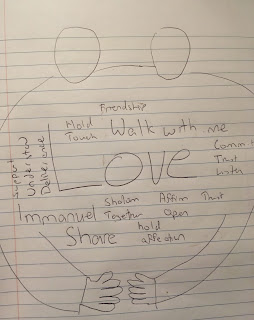I just watched "Pray Away," a documentary on Netflix about the faith-based ex-gay movement.
So-called "reparative therapy," which intends to make gay people straight, has been deemed abusive and unsound practice by every major mental health organization in the country. The documentary chronicles the growth and collapse of Exodus Ministries, one of the biggest purveyors of this lie. It chronicles the cost in human lives and personal integrity that this organization accrued.
It's deeply disturbing.
Christianity is supposed to be a religion that sets people free. It gets twisted instead into a means of control: control through shame, control through peer pressure, control through fear of hell and disapproval, and control through deceit.
Someone's going to say it's about right and wrong, and they're absolutely right. Is God someone who safeguards human dignity, or is he someone who consigns people to being second-class human beings or lower? Where's the moral high ground in telling gays that they can't be with someone they love, that they can't have children, that the God who pursues, the God who won't snuff out a smoldering wick, demands that they change their fundamental identity before they're worth his effort? LGBTQ teens who go through conversion therapy are twice as likely to commit suicide as those who do not.
How appropriate it is in the Parable of the Sheep and Goats that it's we religious folk whom Jesus sends to everlasting fire.
A couple years ago I was working with a faith-based nonprofit organization in which upper management decided to take an official stand on The Gay and communicate it to everyone in a position of responsibility. The position? God loves gay people, but gay relationships are a sin, and we need to support them in a lifetime of celibacy.
Opportunities came for comment. I took them,
"This can be a deeply hurtful message."
"There are other ways to understand those passages of Scripture, based on context and language."
I'm not sure what I expected would happen, I expressed my view, and there was no response. No discussion. To this day, I have no idea if anyone listened to me with anything deeper than polite deference.
The Rutgers School of Social Work has a number of staff who work with its interns out in the field. There's your task supervisor, who works in the organization where you're assigned; and there's your field instructor who helps you to make the connections between what you're doing "in the field" and what you're learning in the classroom.
I talked with my field instructor about that meeting our next talk.
"We have a conflict in values," I said.
I was already 48 by this point, so I won't pretend this was a learning moment for me. I've had plenty of opportunities over the years to disagree with people. I was confident I'd expressed my viewpoint clearly and respectfully, and that I had no reason to budge from it.
You know what the good news is? It's not that God can change you, or that he will. It's really simple, even simpler than that.
It's that God loves you the way you are, no exceptions; and he wants a relationship with you.
And I do too.













 The view from my window is as bleak as it gets.
The view from my window is as bleak as it gets.  We all know what they are. They're formal, binding agreements between two people, without all the boring language that lawyers love to attach to lesser contracts about the party of the first part, and the party of the second, hereafter, heretofore, ex post facto, e pluribus unum, it's all there in black and white, you stole fizzy lifting drink, I said good day sir.
We all know what they are. They're formal, binding agreements between two people, without all the boring language that lawyers love to attach to lesser contracts about the party of the first part, and the party of the second, hereafter, heretofore, ex post facto, e pluribus unum, it's all there in black and white, you stole fizzy lifting drink, I said good day sir.